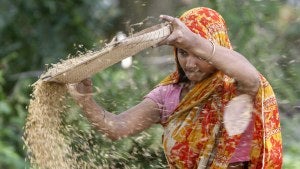Siloed Farmers: Reconciling Information Divides
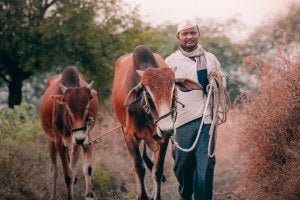 Play Podcast
Play Podcast
About the Episode
Siloes within the agriculture industry create communication barriers that prevent all farmers from receiving equitable access to information. However, through gathering people of different agricultural communities together, it is possible to reconcile the information divide and inspire a new generation of farmers. In this episode of Youth in Agriculture: Transforming Local Food Systems, Ana Carolina Zimmermann and Peggy Tsai Yih examine the different divisions within agriculture, and consider how we can bridge the resulting information divide through youth engagement.
[Intro music.
Natalie Burdsall: INTRO: Hello and welcome to the limited podcast series “Youth in Agriculture: Transforming Local Food Systems,” produced by the Chicago Council on Global Affairs' Center on Global Food and Agriculture. Today, we will be listening in on a conversation with Ana Carolina Zimmermann, a young beef cattle farmer in Brazil, and Peggy Tsai Yih, the Managing Director of the Center on Global Food and Agriculture at the Chicago Council on Global Affairs.]
Peggy Tsai Yih: My name is Peggy Yih. I'm the managing director of the Center for Global Food and Agriculture at the Chicago Council on Global Affairs. I've been working in the area of food and ag policy for I would say eighteen, nineteen years now. I have been really excited to be engaged in this space because of all the important challenges that need to be addressed and wanting to make sure that I am able to dedicate my time to something that I'm passionate about, which is really being able to help in creating some meaningful change that's necessary to make sure that we feed the people that we need to, but in a way that's equitable, in a way that elevates voices that have not been heard before, and to be inclusive in a system that could be discriminatory for different groups of people. So, just really excited to think about how I might be able to use my voice and to use my efforts and talents to create some different, to create change in this area.
Ana Carolina Zimmermann: It is really nice meeting you and I'm, I was very inspired by your, your speech because I'm also, I'm a farmer, I raise beef cattle right in center of Brazil and I am a young and… I am a woman, right. So, it's two trials that farmer… is two groups that normally you don't see very much in farmers around the globe. And I was part of CNA, which is a National Confederation of Livestock and Agriculture in Brazil, the youth program. I'm also an Abbott Scholar, which is a program… a global program for traveling in and developing people. I'm passionate about the communication integration between rural and urban areas because normally we don't seem to talk in the same language and to understand what what's happening in each world. And right now I'm also studying how can we actually raise our voices as a country and as women, as young people as well, to be more well represented across the globe.
Peggy Tsai Yih: Well, I'm fascinated to learn more about how you got into this, in terms of what... was there a specific point in time that you said, well, I really want to be able to work in communication. And you said that you're a farmer, a female farmer. So, tell me more about that in terms of what is it like to be a farmer and what are some of the challenges that you face specifically as a woman in this field?.
Ana Carolina Zimmermann: Well, I'm a production engineer so, it's, I'm not an agronomist or something, so I'm still learning. And I'm a farmer for about two years now, and my dad was a farmer, my granddad from the other side was a farmer. But the specific farm that I work for... it was my grandparents’ before, and then we bought it and I just left my job, I quit my job. I used to work for a dealership, and I wanted to do something different and to have some adventures across the world. And then the opportunity to buy the farm just came. So, it was it was a little bit, a little bit like luck. And then I decided I would take care of it. So it was, it was a little bit suddenly, you know, all of a sudden it was something that I prepared for… and since I'm also from the city and I'm also from the field, I can understand the pain of both worlds. So that's how I have this communication issue. Like, how can we not know the world from each other and as a woman?
It's honestly, sometimes, I think it's worse for being a young woman because, for example, when we ask for training or something on our farm, they come to the manager, which is… which is kind of an employee. And they, for example, I used to say, “Hello” and welcome the stranger, and they would come and say “Hi,” and then they will go to the manager and say like, “Okay, who is in charge?” And they say like, “She's in charge.”
To be very honest, I'm also in a very privileged position in which I was able to have education and I have a nice family and I have a good network and support. And I know, I know that that's not everybody's condition. And that's why we don't have more people like me, you know, like as women and young people talking and then being able to speak in English, for example, because that's not our native language. So, my question is how can we actually bring other people to the conversation and to make those opportunities for those people? I was listening to you, Peggy, and how can we actually be more inclusive and bring people who don't have that much opportunity also?
Peggy Tsai Yih: I'm so inspired by what you said, and it's absolutely just trying to make sure that we elevate those voices and it's exciting to hear about how you see that gap in understanding and want to be able to address that communication gap with the rural and the urban areas and educate people more about what it is those challenges that farmers face and for people to have a better understanding of how their food is produced.
Ana Carolina Zimmermann: And tell me a little bit more about you. I was so excited when I saw your CV. You are working with strategy and also facilitating and teamwork. That's not really common in agribusiness in general, right? Even strategy. Sometimes you go inside of a property and then you don't see much of management in general, right. So, how important is it for us to have people like you with your abilities and how can we actually get more people like you into our business?
Peggy Tsai Yih: I'm privileged to have a great job and where I'm able to bring some of the best thought leaders together and some of the experts who address these issues on a daily basis and to try and elevate their voices and to come up with solutions together. So, it's absolutely critical that we bring people together for conversations and on issues that we believe are important to address and to figure out the space, to have the time and space to be able to address them and then to figure out what are the next steps forward in developing that strategy where we all see what the problems might be, but how do we make a pathway for the future to address those issues? So, I think, absolutely, in terms of if we continue doing the same things it might be comfortable, but it may not be the most beneficial thing to do. We know that change is hard and that's sort of what our role is here in terms of being able to prod people and getting people out of their comfort zone because we see a greater, greater good coming out of these challenging spaces and from the discomfort that people might feel when they're being challenged for doing what they're currently doing.
Ana Carolina Zimmermann: You know, last year I was at the CFS, the Committee on Food Security in Rome, and there was lots of diplomats and not many farmers… I mean, we had some farmers. But this problem with rural and urban communities, that's also something about public policies. Because I have the impression that those diplomats, even though they are very competent in what they're doing, they don't really know what happens on the ground, right? The reality of what's happening within our farms and, for example, we were talking in a high-level dinner on data collection and on how can we actually collect more data. But in my farm, we didn't even have good access to Internet, you know.
Peggy Tsai Yih: Yeah.
Ana Carolina Zimmermann: So, you're like, infrastructure medium size… I mean my father, he, he has more infrastructure with grains, for example, and me it's in cattle business. It’s different infrastructure, and also access to good roads and etcetera. I know that lots of people don't face it anymore, but in some countries we do. For example, in Brazil, we have great farms, we have huge farms, but we also have medium and small, smaller sized farms in which we are very dependent on the government for having better infrastructure, so how do we... how can we actually show the reality of the farming business, agribusiness sector to policy makers?
Peggy Tsai Yih: Well, I think by being able to feature people like you in terms of... here's the face of someone who is a farmer who has faces these struggles with as you talked about—the lack of data or Internet connection in terms of roads that to be able to carry some of the products out. I think with policymakers their constituents are the ones that raise the issues, and they're the people who contact them. The loudest voices are the ones that usually get the attention. And this is a phrase that Roger Thurow always uses in terms of, we need to “raise the clamor.” So, we need to make sure that people are... they understand who it is, who's the face of agriculture. Because, I think at least in the United States, the perception is that a lot of the farmers are older and they're white and that they're men. And I think it's so exciting to see you and to meet you because here's the face of the future and it's not what we typically see. And to be able to get policymakers to say that these are the people who are going to secure our food future, and also to be able to make changes in the future for what we want to be able to be and creating the future that we want.
Ana Carolina Zimmermann: And what is the role that organizations like the Chicago Council play?
Peggy Tsai Yih: We try to get together some of the best experts and thought leaders who want to make a difference, and then we gather people together to talk about what the challenges are and then try to identify some spaces forward in making progress for the future. What we also try to do is we try to see it from a policy perspective: what are some things that the government can do to make these changes happen? And we have been very successful in advocating for these changes with the US government and Congress and in the administration. We've been really fortunate because the messages that we have been able to convey are really compelling. So, in terms of wanting to make sure that we're able to ensure that with agricultural development and with food security and how that is a direct tie to national security, wanting to make sure that we're allowing countries to provide them with the resources that they need to succeed, so that it's not a humanitarian crisis of feeding people in situations where they are refugees. I've been really thankful and fortunate that the Chicago Council continues to be in this space to try to make an impact on these issues that may seem to be… not necessarily at the top of policymakers' minds, because I think a lot of the times their constituents raise issues that they care about, but in terms of global food security is something that people may not be at the top of their mind.
I'm curious to learn a little bit more about some of the challenges that you have been facing, specifically as a young farmer. And I think you've talked a little bit about how people see others in terms of in management positions rather than you as the owner and the manager. But can you tell me a little bit more about some of those challenges and what you think people should do to help and overcome some of those challenges?
Ana Carolina Zimmermann: Well, first you mean as a farmer in general or in as a farmer as youth?
Peggy Tsai Yih: I would say specifically your experience.
Ana Carolina Zimmermann: In Brazil, we have a saying that “Brazil is not for amateurs.” You know, we have very complex situations. And people is one of them, actually. So, having good, qualified people who are willing to work… I mean, we have brilliant people. But brilliant people were not very prepared to be on the field. So, it's very hard. People who studied a lot and that's not the common career. You know, I come from a movement called the Junior Enterprise Movement, which is a movement within universities and normally we would have huge sponsors with big, big consulting groups sponsoring and different kinds of sponsoring groups. And we wouldn't have any like in the whole Brazil, we wouldn't have anybody from the agribusiness in general. So normally we don't see agribusiness as a way or as a potential career path. Normally people who are in agribusinesses, they were people who didn't study much or who didn't have opportunities and now we're starting to have these differently to think, “Oh, I have to study to be in this sector, I have to study to be here.” So, I would say that dealing with people… I love doing it, but having qualified labor to work in our farm is number one challenge that we face.
Second one... Brazil, it's quite big. I mean in the United States they also have this problem, but for example, my friends in Europe, it's completely different. So, I'm based in Brasília right now, which is the capital. And my farm is like three hours and half from here. So, to go to my farm I have to drive and if I wanted to go and come back on the same day, I have to drive seven hours to go.
Peggy Tsai Yih: Wow.
Ana Carolina Zimmermann: So, infrastructure and roads are very, very ring, and this is also a challenge complexity of market and it's a little different. First of all, my father his... he's already working for 30 years in the market, with this flow, this complexity and then I have just two years to learn it all, you know, and to understand all this. So, I believe like having to deal with everything changing so much on all the time and having to learn so many things about technical stuff about the past year, how you can actually regenerate pasture and dealing with environmental issues, people thinking that Brazil is not sustainable enough, but we are sustainable and having to communicate what we were doing, you know, this whole mess.
Peggy Tsai Yih: That's a lot.
Ana Carolina Zimmermann: It's, it's quite overwhelming. But it's actually... I'm learning a lot from this process and I'm actually… the good thing about starting to learn everything from scratch is that I'm sharing this through social media or friends with places that I have. And since I have this curious eye, you know, as a child looking for, “Oh, that's new for me.” I think that's the way of sharing to people who don't have access to this kind of information. For example, in my Instagram I would take pictures of the cattle and they see the earrings, like the electronic earrings, and people from the city wouldn't know, “What is that for?” Well, it’s actually for traceability, you know, so we can start a conversation about it and it's a nice processing in sharing what I'm what I'm learning.
Peggy Tsai Yih: Yeah, I love that you're utilizing these new platforms like social media and Instagram to be able to share in terms of here's tag for traceability purposes. Your engagement and excitement to want to learn and to not feel overwhelmed by the whole process is really admirable. So, I'm wondering though in terms of… it sounds like there's just so much to... in terms of being able to handle and it's changing a lot too with a lot of technological advancements. If you were to talk to somebody who is maybe in school right now, thinking about a career in agriculture, or maybe they haven't even thought about a career in agriculture, how would you get them excited, or what would you say to them to... sharing the passion that you have for what you're doing?
Ana Carolina Zimmermann: That's a great question. First, I believe there is space for any kind of professional in agribusiness because we need people from different areas. For example, if you're working with marketing, we need people either for advertisement or for communication. If you're working with law, we also need people who are working with law and tax management, you know to understand all this finance situation, and especially in Brazil with a sector that’s growing a lot and it has major importance in the country with exportation also. Like, amidst the COVID crisis, we were the only sector growing exponentially and then hiring more people. So first, it's an… it's a market that's very... it's really opening opportunities for people. That's the first thing. The second one, it's very dynamic and can be very interesting to work with and especially because we have this huge challenge because we need to make food for more and more people who are coming, but we also have to be sustainable. So that’s kind of a big challenge and I can just say that there's opportunity for everybody and it's really something that you, you would be questioned about. Yeah. And I also have the question about how does your work inform your perception of global food and agriculture in this sense?
Peggy Tsai Yih: I think being part of a group where I'm surrounded by really passionate people who want to change the world to make sure that we end hunger, I think is really inspiring in the sense of… there are people who have dedicated their whole lives. So, for Catherine Bertini, who is the former Executive Director of the UN Food Programme, has done this for about a decade, and continues to be a champion in this space. And that's really an inspiration for me. Even though there's so many different challenges related to conflict, related to climate, that really have made global food insecurity even worse over the years, she's not daunted by how there's still so much more good to be able to do in addressing the major challenges that we see related to COVID and conflict and climate.
And I think in terms of the work related to sustainability, I think you talked about is… is sustainability? I certainly see that as a huge challenge that we are facing in the future because, as you mentioned before, we're trying to feed more people with existing resources, and that's… that seems like you're going to have to pull a rabbit out of a hat. It's a magic trick. How do we do that more efficiently, more environmentally friendly? How do we do that with sustaining the existing resources we have, so that we don't exhaust them for the future and wanting to make sure that our children and grandchildren have the same access to the resources that we do? I think it's incredibly daunting, but at the same time, wanting to make sure that people are fed. So, it may seem like it's a no-win situation. But I do think that with human ingenuity and creativity and political will and people who are passionate about this issue, that we can find creative solutions to make it work. And with all of the technological capabilities that we have right now and what I can only imagine will be available in 25 years, it's going to be pretty incredible. I mean I can't even imagine … I don't think we were even talking about artificial intelligence or robotics 20 years ago. But now, it's very much something that people are using and considering. So, it's really exciting to me to think about the future for related to being able to solve that challenge of how do we get to a place where people are no longer hungry, but also at the same time being able to sustain our natural resources in a way that conserves it for future generations to come.
Ana Carolina Zimmermann: I love your enthusiasm. Sometimes when I'm thinking about this question as well, I get terrified because it can be really daunting right.
Peggy Tsai Yih: Yeah.
Ana Carolina Zimmermann: I mean even it's not only AI—iPhone. I mean, 20 years ago we didn't have iPhone. We have more information right now than the President of the USA, I don't know, 30 years ago or something just with computers. So right… So I get terrified, but it at the end of the day I prefer being optimistic about it. And I love meeting people like you because it gives me a little bit of comfort. You know that everything is going to turn out fine, but in between, we also have to stay awake and look for how to make more opportunities for people who don't have those opportunities, right. And I think agribusiness and farming is one of those opportunities if we can make it equitable. Yeah, with those benefits.
Peggy Tsai Yih: Yeah, absolutely. And every voice matters and every action that we take matters too.
Natalie Burdsall: I want to thank you both, Ana and Peggy, for providing your thoughts and insights on youth engagement in global food and agriculture.
[Natalie Burdsall: OUTRO: And thank you for tuning in for this episode of “Youth in Agriculture: Transforming Local Food Systems.” As a reminder, the opinions you heard belong to the people who express them, and not the Chicago Council on Global Affairs. This episode is produced and edited by me, Natalie Burdsall. Thank you for listening—we’ll see you again next week.
Outro music.]








Other Episodes
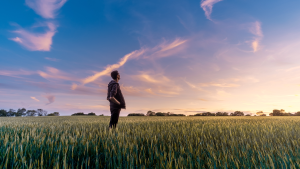 Food and Agriculture
Food and Agriculture
Young people are the future of agriculture—so why aren't they getting involved?
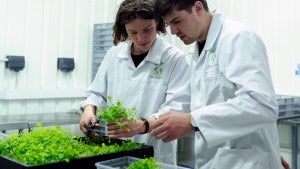 Food and Agriculture
Food and Agriculture
Collaboration across generations, communities, and political parties is pivotal to agricultural development and youth engagement.
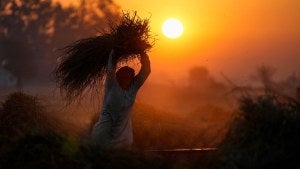 Food and Agriculture
Food and Agriculture
How do we nourish the population, while protecting the planet from the very act of nourishing us?
